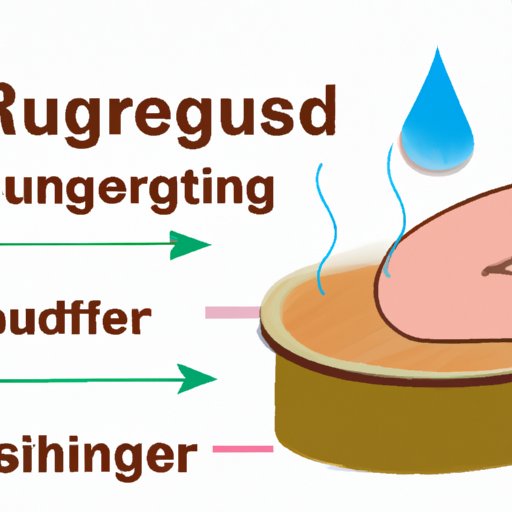
Introduction
Constipation is a common digestive problem that affects individuals of all ages. It occurs when the bowel movements become difficult, infrequent, or incomplete. The condition can cause discomfort, bloating, and other unpleasant symptoms that can significantly impact one’s day-to-day life. Immediate relief methods are thus essential, and there are several ways to address this issue. This article aims to explore various quick tips and lifestyle changes that can help relieve constipation promptly and prevent its recurrence.
Quick Tips for Immediate Relief
Here are some practical techniques that can offer immediate relief when experiencing constipation:
Squatting Position
Squatting is a natural and effective way to relieve constipation, and it has been utilized for centuries in cultures across the globe. This technique involves sitting on the toilet with your feet raised on a small stool or platform. The squatting position straightens the rectum, thus allowing the stool to pass more effectively. Place your feet on a small stool or stack of books and slightly lean forward, keeping your elbows on your knees and encouraging bowel movement.
Stomach Massage
Stomach massage is another way to stimulate bowel movements and relieve constipation. Begin by lying down and rubbing your stomach in a clockwise direction, using gentle but firm pressure. This motion can help move things along by increasing peristaltic activity in the colon. Repeat the process for at least 10 minutes and breathe deeply while massaging to assist the relaxation process and facilitate bowel movement.
Warm Water
Drinking warm water is an age-old remedy that can also help relieve constipation. Warm water acts as a natural lubricant, which can assist in moving stool smoothly through the digestive tract. Additionally, warm water helps soften the stool, making it more comfortable to pass. Drink two to four cups of warm water, essentially after waking up in the morning and before bed at night. This simple technique can also help keep your body hydrated, which is essential for good digestive health.
Breathing Exercises
Breathing exercises can help to relax your body and address the anxiety that constipation can cause. Practicing yogic breathing techniques like Pranayama or belly breathing is an excellent way to manage the stress associated with constipation. Belly breathing involves focusing on your breath, relaxing your abdomen and lower jaw, and breathing in through your nose from your diaphragm. These exercises can also lower blood pressure and increase the oxygen level in the body.
Use of OTC medications
Over-the-counter (OTC) medications like fiber supplements, stool softeners, and laxatives can provide safe and effective relief from constipation. However, consult with a doctor or pharmacist before use to understand how these medications work and to avoid any harmful side effects. Additionally, it is important to note that long-term use of any medication should be avoided without consulting with a doctor.
Importance of Regular Exercise
Physical activity can help move things along in the digestive system and relieve constipation. Exercise increases blood flow to the intestines, which helps stimulate peristalsis or muscular contractions in the colon muscles. Walking, running, and yoga are excellent ways to incorporate exercises into everyday routines, which can also promote good mental and physical health.
Lifestyle Changes to Help Prevent Constipation
Making lifestyle changes can help prevent constipation from occurring in the future, and here are a few:
Importance of a High-Fiber Diet
A high-fiber diet is essential to maintain regular bowel movements and prevent constipation. Foods like whole grains, fruits, vegetables, and legumes should be incorporated into everyday meals to help maintain the necessary fiber intake requirements. Gradually increase fiber consumption to avoid becoming gassy, bloated, and uncomfortable. Consultation with a nutritionist or doctor can also benefit determining a diet plan based on individual needs.
Hydration Importance
Staying hydrated is crucial for a healthy digestive system, and it can also help relieve constipation. Water softens the stool and makes bowel movements more comfortable, so it is essential to drink at least six to eight glasses of water daily. Avoid consuming sugary drinks, tea, and coffee in excess, as they can cause dehydration and exacerbate constipation issues.
Exercise
Incorporating regular exercise into daily routines is a sensible strategy for preventing constipation and maintaining overall good health. Exercise improves blood flow and strengthens muscles in the body, making it easier for the digestive system to work effectively. Thirty minutes of exercise at least five days a week is recommended, but it is crucial to speak to a doctor before starting any new exercise routine, especially for individuals with underlying medical issues.
Doctor Consultation
If constipation persists despite trying lifestyle changes and other remedies, it is best to consult your doctor or digestive specialist. Doctors can determine the underlying medical causes of constipation and offer adequate treatment plans for long-term relief. Individuals with preexisting digestive problems, such as inflammatory bowel disease, should also consult a doctor before introducing any significant lifestyle or diet changes to avoid exacerbating their symptoms.
Conclusion
Constipation is an uncomfortable and common condition, but it can be relieved and prevented with various quick tips and lifestyle changes discussed in this article. While some methods provide immediate relief, such as squatting, warm water, and stomach massages, others like high-fiber diet, staying hydrated, and regular exercise promote good digestive health. It is essential to consult a doctor if constipation persists, and always seek out the underlying cause, so the appropriate treatment can be provided. Trying different quick tips and lifestyle changes will help achieve long-term relief for each individual’s constipation.




